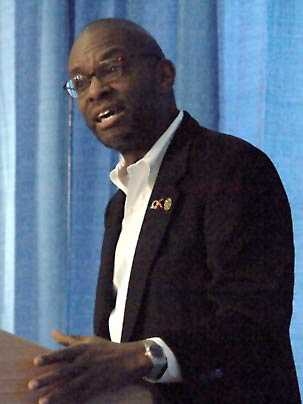MIT's 33rd annual Dr. Martin Luther King Jr. Celebration, held Friday, Feb. 16, was a sign of the Institute's "extraordinary commitment to the principles of Dr. King," as President Susan Hockfield told the capacity crowd at Walker Memorial.
But this is a time when there is a great need to "accelerate the pace of change," she added.
"If MIT today is to advance its historic mission of teaching, research and service, we simply must increase opportunities for minority faculty, students and staff," Hockfield said.
"King urges us to walk together," she said, referring to his renowned 1963 "I Have a Dream" speech, from which she read an excerpt. "We have been walking forward. But we need to pick up the pace."
Participants at the celebratory breakfast, which also featured musical selections by the MIT Gospel Choir and solos by Hiram Ettienne, administrative assistant in electrical engineering and computer science, could not ignore racism or injustice at MIT or anywhere else, Hockfield said: These are "issues that reach beyond any single individual or any single institution."
Still, in the larger context, the president had some good news to report: Of new faculty on campus this year, 11.5 percent are members of underrepresented minority groups. And this year, there are eight new MLK visiting professors and scholars, more than ever before in the program's history.
And Hockfield pointed to the Institute's ongoing gender-equity initiative as a model, both for what can be achieved with concerted effort and the kind of national influence an MIT initiative can have.
"We want our new initiative on minority faculty issues, recently announced by the provost, to have the same catalytic impact and to demonstrate the same kind of institutional and national leadership," she said.
The title for this year's King celebration was "Maximizing Potential: The Congruence of Diversity and Excellence." Two student speakers reflected on this topic and on King's life and legacy.
Elizabeth Clay, graduate student in urban studies and planning, made an impassioned plea for justice and equity in cities. "As a master's student in urban planning, I often think about what makes a city great," she said.
Cities like New York, London, Mumbai and São Paolo, she said, "all draw from the best and the brightest, the most creative and the cleverest. New citizens dare to make their marks there, and in doing so, make those cities wealthy and vibrant. Their excellence and their diversity exist in a virtuous circle.
"But often it is those who bring so much to the city … that struggle to afford the city they helped build."
She cited the discrimination that Latin American immigrants often face in the United States, for instance. "And similar discrimination faces construction workers who build the gleaming towers of Mumbai and yet go home to illegal settlements with no water and no toilets."
In her talk, senior Tabitha Bonilla cited her own German-Jewish-Mexican family as an example of the true wealth inherent in diversity, and she reflected on discrimination both against--and among--underrepresented minorities.
The keynote speaker at the King breakfast was Ted Childs Jr., a former IBM executive now in practice as a diversity consultant. Considering the future workforce of the United States, he lamented the lack of a "competitive national talent strategy."
He noted how low high school graduation rates are in the United States compared with other developed countries, and he noted the low numbers of engineers the United States is graduating every year (75,000) in comparison with other countries (85,000 in Russia and 200,000 in China, for instance). "And those people speak their own language plus English," he said.
He called for a "national dialogue" about requiring a second language for high school graduation.
In the interest of national competitiveness, Childs, who is black, told the group, "We have to end the focus on affirmative action as a race and gender dialogue. Affirmative action has to be about disadvantage. People who are white and poor have to be able to benefit from affirmative action because we need them on the playing field."
Childs read aloud an extended except from an interview in the Feb. 12 New York Times with Drew Gilpin Faust, newly named as the next president of Harvard University. It seemed to be for him both a sign of how times change and a confirmation that in the bad old days, things really were as bad as the activists feared.
Quoting from Faust's comments about her childhood in 1950s Virginia, he read, "There were formalized ways of organizing almost every aspect of human relationships and interactions--how you placed your fork and knife on the plate when you had finished eating, what you did with a fingerbowl, who walked through a door first, whose name was spoken first in an introduction, how others were addressed--black adults with just a first name, whites as 'Mr.' or 'Mrs.'--whose hand you shook and whose you didn't, who ate in the dining room and who in the kitchen."
"I have heard stories of that," Childs said, "but it's the first time I have ever seen it in writing."
A version of this article appeared in MIT Tech Talk on February 28, 2007 (download PDF).






